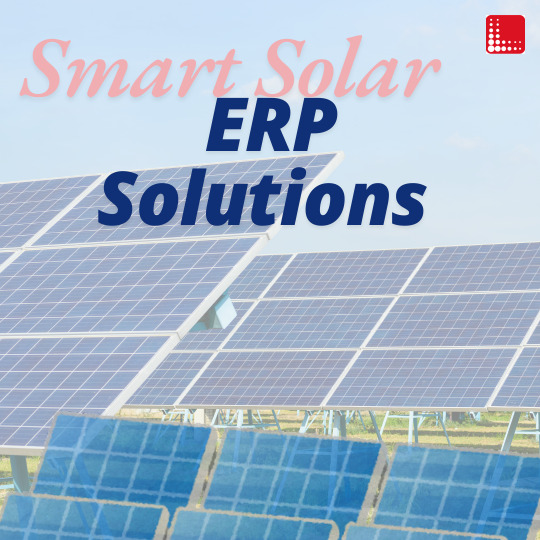#EnergyCompliance
Explore tagged Tumblr posts
Text
Optimizing Solar Panel Manufacturing with ERP Systems
The solar energy industry has been booming and placed very great pressure on solar panel manufacturers to streamline their operations, cut their costs, and enhance their product quality. Among the effective solutions is the enterprise resource planning system(ERP) specifically designed for solar panel manufacturing. ERP systems serve to unify all business processes on a single platform, habiting manufacturers to achieve efficiency, compliance, and profitability.

Why ERP is Essential for Solar Panel Manufacturing
Solar panels need to be manufactured through complex processes ranging from raw material procurement through production, quality control, and distribution. It would cause inefficiency and an increase in cost to overlook the management of these processes. Without proper maintenance, such a systematic approach could be rendered ineffective. Usage of real-time data visibility by the ERP system to automate actions could be beneficial for solar panel producers.
Key Benefits of ERP for Manufacturing Solar Panels:
Efficient Supply Chain Management The tracking of solar panel raw materials which include silicon, glass, and aluminum materials is very possible these days, which leads to efficiency with respect to procurement. This process improves both inventory levels and supplier collaboration, so delays and wasted assets are minimized.
Definitely Beneficial to Production Efficiency ERP systems help solar manufacturers prepare production plans and the timetables for each of the processes to help optimize the use of resources and prevent downtimes. Also, automatic workflow cues complete tasks, making production efficient.
Intensified Quality Control Quality is most critical in the solar panel manufacturing process. It integrates quality checks at each production level; produces products that meet industry standards and consumer expectation; ensures quality throughout the process.
Regulatory Compliance The solar energy industry is heavily regulated, and companies spend out of human labor potential in safety and environmental implications. Compliance reports are automated and compliance is guaranteed according to safety and consumer expectations
Financial Management It uses cost tracking tools together with budget and profitability analysis tools to manage the financial performance of enterprises.
Decision-Making Factored in by Data With advanced analytics, ERP systems for solar panel manufacturing deliver actionable insights. This helps manufacturers identify trends, forecast demand, and make informed decisions to stay ahead in a competitive market.
Features of ERP for Solar Panel Manufacturing
Inventory Management Real-time tracking of raw materials and finished products to prevent stockouts or overstock situations.
Production Planning Tools to optimize production schedules based on demand forecasts and resource availability.
Quality Assurance Integration of quality checks to ensure consistent and reliable solar panels.
Supply Chain Coordination Seamless communication with suppliers for timely procurement of materials.
Compliance Reporting Automated tracking and reporting to meet industry and environmental regulations.
Financial Analytics Insights into production costs, revenue, and profit margins for better financial control.
Implementing ERP in Solar Panel Manufacturing
While the benefits of ERP for solar panel manufacturing are significant, implementing such systems requires careful planning. Manufacturers should: 1. Choose an ERP solution tailored to the unique needs of solar panel manufacturing. 2. Train employees on the use of the system. 3. Partner with experienced vendors to ensure a smooth implementation process.
The Future of Solar Panel Manufacturing with ERP
ERP systems are transforming the solar energy industry by enabling manufacturers to optimize operations, reduce costs, and enhance product quality. In a market driven by innovation and sustainability, ERP for solar panel manufacturing is not just a technological upgrade but a strategic necessity.
By integrating processes, ensuring compliance, and enabling data-driven decision-making, ERP systems empower solar panel manufacturers to meet growing demand while contributing to a sustainable future. Investing in the right ERP solution today will pave the way for long-term success in the renewable energy sector.
#ERPForSolarPanelManufacturing#SolarPanelManufacturing#RenewableEnergySolutions#ERPSystems#SustainableManufacturing#EfficiencyInProduction#SupplyChainOptimization#QualityControl#EnergyCompliance#DataDrivenDecisions#ManufacturingInnovation#GreenEnergySolutions
0 notes
Audio
The Demand for the California Building Codes
The California Title 24 Building Codes were initially implemented in 1978 and its purpose is to act as a measure to reduce energy consumption and to promote energy conservation. Visit: http://t24energyreports.com
0 notes